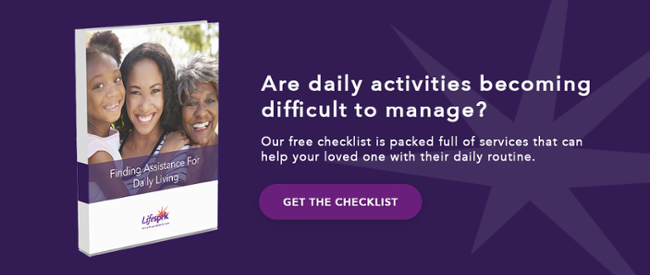While social distancing is the recommended practice for the foreseeable future, many of us may be finding ourselves at home alone with very limited contact with our loved ones. With seniors at a higher risk of becoming seriously ill from COVID-19, they need to take all precautions during this pandemic.
“The biggest challenge with social distancing is that it can further isolate a population who have always been at risk for social isolation,” said Tanya Castillo, RN, Lifesprk Director of Community Home Care. “This pandemic has only escalated that health risk and we need to reach our seniors now more than ever to support their health and life goals.”
Prolonged social isolation can be as big a health risk as smoking 15 cigarettes per day, according to the National Association of Area Agencies on Aging (n4a). Ninety-percent of the factors that shape poor health outcomes are due to reasons other than health such as social isolation and yet few healthcare options address the full scope of life challenges many seniors face which can lead to frequent hospitalizations and a downward cycle of independence. In a pandemic, not keeping seniors socially connected can be a serious risk.
Add to that, changes in their routine can be particularly challenging for seniors who may live alone and rely on regular social interactions. Loneliness can be a serious problem — long-term isolation has been linked to cognitive decline, depression, and cardiovascular disease.
There is good news. While the effects of social isolation on your loved one can seem worrying, we’ve developed tactics for you to help your loved one cope during these times of social distancing so they (and you) can maintain their mental and physical health as well as their happiness.
Lifesprk is ready to support and guide you and your senior loved one and find the ‘spark’ during this pandemic to stay healthy and happy.
Mental and physical effects
Loneliness can negatively affect a senior’s mental health and well-being and many may find they suddenly feel down or depressed and struggle to shake the feeling. Without usual social interactions to look forward to during the week, your loved one might not feel as motivated as usual. Seniors may struggle to follow a routine without these regular intervals which can result in long bouts of sitting, disregarding daily routines, and falling behind on self-care.
Without any physical or mental challenges during the day, your loved one might find themselves struggling with a lack of motivation that directly affects their eating and sleeping habits. Regular activities like exercise classes, coffee mornings, religious gatherings, and family outings are all likely on hold right now and your loved one may notice a lull in their daily routine. This lull can result in excess energy by the end of the day.
Everyone’s situation is unique during a time like this, Lifesprk has a wide variety of resources to help senior loved ones keep their spark, stay active, and find positivity in each day.
Leveraging technology to combat loneliness
Social isolation among seniors is not a new risk for seniors. Today’s social distancing guidelines during this pandemic have increased the problem. While you may be used to dropping by and checking in on your loved one every few days or inviting them over to be with the family, this may not be possible given the current circumstances.
Although it might feel impossible to replicate these interactions from afar, using video technology like FaceTime or Zoom can help loved ones feel more connected. Try scheduling video calls at the same time that you would normally see your loved one and if possible, do a similar activity together.
By keeping things fun and positive your loved one will have something to look forward to even if you cannot physically be together. Many seniors are tech savvy but for those who aren’t, remember to be patient while they try out new technology they may not be familiar with. Reach out and ask if they need help getting started.
Keep your loved one busy
If your loved one is struggling to develop a new routine and is missing their typical events and activities, try making their day as busy and full as possible. There are many activities they can do on their own like:
- reading
- puzzles
- baking
- light exercise
- journaling
- gardening
At first, they may be resistant to changing their routine, but filling their days with activities will lead to an improved mood. If they’re active and busy during the day, their mind will remain healthy and they won’t have time to think about what they’re missing out on. Keeping busy and staying positive is key to making sure your loved one is happy and healthy — both mentally and physically.
How Lifesprk can limit the impact of social isolation
Lifesprk’s whole-person approach has always addressed social isolation, we know that helping people find what gives them purpose increases their life experience and improves health outcomes. If you or your loved one need support during, and after, these difficult times, Lifesprk is here to help. Whether you need day-to-day in-home support, medical care at home, a driver companion to help with errands, or just some friendly guidance, Lifesprk can help.
Call us at 952-345-0919 or fill out free consultation form online. Check out our free resources to keep your loved one happy and healthy at home.



